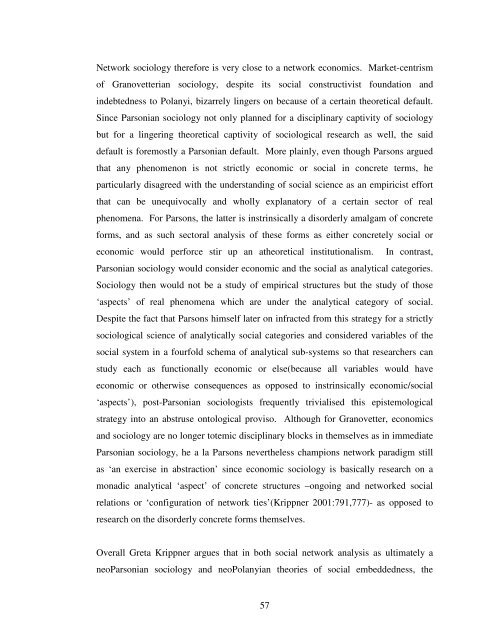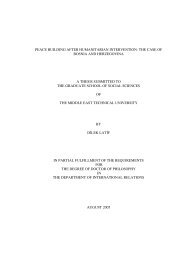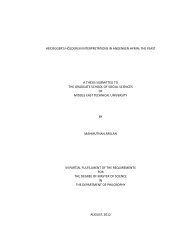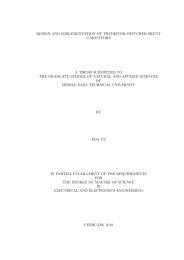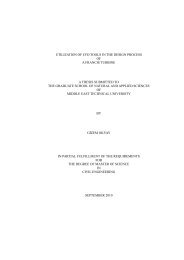View Original - Middle East Technical University
View Original - Middle East Technical University
View Original - Middle East Technical University
Create successful ePaper yourself
Turn your PDF publications into a flip-book with our unique Google optimized e-Paper software.
Network sociology therefore is very close to a network economics. Market-centrism<br />
of Granovetterian sociology, despite its social constructivist foundation and<br />
indebtedness to Polanyi, bizarrely lingers on because of a certain theoretical default.<br />
Since Parsonian sociology not only planned for a disciplinary captivity of sociology<br />
but for a lingering theoretical captivity of sociological research as well, the said<br />
default is foremostly a Parsonian default. More plainly, even though Parsons argued<br />
that any phenomenon is not strictly economic or social in concrete terms, he<br />
particularly disagreed with the understanding of social science as an empiricist effort<br />
that can be unequivocally and wholly explanatory of a certain sector of real<br />
phenomena. For Parsons, the latter is instrinsically a disorderly amalgam of concrete<br />
forms, and as such sectoral analysis of these forms as either concretely social or<br />
economic would perforce stir up an atheoretical institutionalism. In contrast,<br />
Parsonian sociology would consider economic and the social as analytical categories.<br />
Sociology then would not be a study of empirical structures but the study of those<br />
‘aspects’ of real phenomena which are under the analytical category of social.<br />
Despite the fact that Parsons himself later on infracted from this strategy for a strictly<br />
sociological science of analytically social categories and considered variables of the<br />
social system in a fourfold schema of analytical sub-systems so that researchers can<br />
study each as functionally economic or else(because all variables would have<br />
economic or otherwise consequences as opposed to instrinsically economic/social<br />
‘aspects’), post-Parsonian sociologists frequently trivialised this epistemological<br />
strategy into an abstruse ontological proviso. Although for Granovetter, economics<br />
and sociology are no longer totemic disciplinary blocks in themselves as in immediate<br />
Parsonian sociology, he a la Parsons nevertheless champions network paradigm still<br />
as ‘an exercise in abstraction’ since economic sociology is basically research on a<br />
monadic analytical ‘aspect’ of concrete structures –ongoing and networked social<br />
relations or ‘configuration of network ties’(Krippner 2001:791,777)- as opposed to<br />
research on the disorderly concrete forms themselves.<br />
Overall Greta Krippner argues that in both social network analysis as ultimately a<br />
neoParsonian sociology and neoPolanyian theories of social embeddedness, the<br />
57


